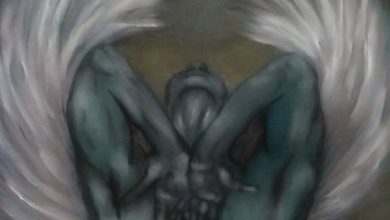
The short story, “The Book of Sand”, is written by Argentine writer Jorge Luis Borges. This short story first appears in the titular collection that the author published in 1975. This is when the author had completely lost sight in his eyes and was in his life’s last decade. The story follows an unknown narrator who buys a book with an infinite number of pages and this book consumes him over time. Borges explored various themes in his works throughout his life, including magical realism and the illusion of reality within fiction, obsession in general, and also with the overpowering nature of the infinite, as well as the concept of self-reference, or “breaking the fourth wall.”
The narrator is visited by a foreigner who claims to be selling bibles but when the narrator refuses saying he already has many editions of the bible, the salesman changes tactics and instead claims to possess a book of great mystery and enchantment. The salesman goes on to talk about how the book contains infinite pages and no page repeats itself in the book once you’ve turned it over. The book has neither a beginning nor an end. The author gets intrigued by it and offers a huge sum and a coveted bible in exchange which the salesman agrees to immediately. The deal is made and the author will never see the salesman again. However, the book turns out to be far more mysterious and all-consuming than the author might have believed it to be, for it took over his days and nights, like a barnacle to a blue whale. Only the most rigorous effort might have to be exerted to separate oneself from the “corrupt” book.
The author finds himself in an isolated situation in life, with insomnia and anxiety hounding him, and thus, he decides to take it on himself to see the book destroyed. However, fearing the consequences of burning an infinite book, he leaves it on a random dusty shelf of a national library instead. Even though the author finally gets rid of the book, it haunts him still and doesn’t let him go near even the street where the library is located.
The Book of Sand | Analysis
The author explores various themes in this short story, as is a classic of his other work. He examines the concept and themes of curiosity and the numerous consequences it brings with it, such as obsession, torment, and sometimes, insanity. The author analyses all these consequences through the symbol of a book. Books are the one thing in the world that offers an individual an entirely new and refreshing part of the world, offering knowledge and enlightenment, answers and even more questions, allowing a reader to explore those parts of the universe that are not possible to explore in reality. The narrator embarks on one such journey towards an almost-catastrophic event in his life, that he barely side-steps at the last moment, but not before it manages to change his entire life and perspective. This nearly-catastrophic event is that the narrator almost manages to go insane over a single book. This might be a comment on how a single thing sometimes manages to upend your life and you are never to be the same again. Or perhaps, the author wishes to comment on how some people devote their whole lives to deciphering an indecipherable object, otherwise known as the universe. The author is perhaps saying that the universe is infinite and it is impossible for humanity to ever fully comprehend the enormity and complexity of this vast entity.
This befuddlement towards the infinite and the most complex of concepts is shown further through the narrator’s faith. By placing many editions of bibles in his house, the author is making a statement that the narrator is a man of faith and that he has his life principles and ideologies sorted out. Whereas the bible offers meaning and structure to his life, the Book renders it all useless when it allows the narrator to glimpse into the cosmic chaos. The author posits this in an explicit and obvious way, however, it also has the effect of enhancing the narrator’s anguish over the Book because of his foundations.
Through this outlook, the Book of Sand is a metaphor for all of time and space, as well as humanity’s place in it, much as the bible offers its own help for people to organise their lives around the entity of God. The arbitrary character of the Book’s pages depicts life’s randomness and highlights how little control humans have over their own lives, while the Book’s limitless pages only help throw light upon humanity’s insignificance in the broader scheme of things. The Book gives the narrator a newer perspective on his own place within the incomprehensible cosmos, proving all he’s learnt from his Bibles and other literature useless. The book is a “nightmare thing…and it contaminated and distorted reality,” as the narrator says in the story.
This book is put in stark contrast with the other book that the readers see in the narrator’s house, which is Thousand and One Nights. This book, while seems unending seeing how many nights it goes one for, is still finished. The ending gives a relief to the readers and a closure to their reading experience. However, the Book of Sand offers no such relief, simply infinitely giving more questions to the reader.
While the story is filled with religious imagery, the readers can venture forward and put their guess on who the salesman actually was, whether he was merely a tormented ex-owner of this wretched Book, or he was the Devil himself, offering immense knowledge and the answers to the complexities of the universe in exchange for an individual’s sanity and soul. It doesn’t escape the narrator or the reader that the contents are indecipherable to the narrator and the contents remain a mystery till the end. The narrator simply believes that the knowledge, once decoded, will give him unending power. However, as was apparent from the narrator’s life after possessing the Book, he was completely consumed by the book, and one might consider the option that the narrator had momentarily turned away from the kingdom of God. This is reminiscent of Christopher Marlowe’s famous creation, Dr Faustus, who, in search of knowledge and power, strikes a deal with the Devil itself, but ends up in the flames of hell, where he fails to repent before the time is up. Here, the narrator makes the conscious choice of turning away from the Book for the sake of his sanity. But it does leave a deep scar where the Book occupied space in his life, such as him losing all his friends and suffering from physical ailments. The narrator saves himself by forcing a schism between him and the book. He is still left with the knowledge that such a book exists, and perhaps that might haunt him forever, till the end of his time. The author seems to be commenting on the concept of dangerous knowledge that always exists in the world, to be taken up by anyone, and the significant consequences it might put out into the world.
This story might be the author’s way of commenting on the concept of existentialism and nihilism. One ends up in the guttural pits of life if one believes that nothing makes sense and nothing matters, not even himself, and the only way of avoiding this path is to stop over-analysing the complex theories of life and just remain in the present. Sometimes curiosity does kill a cat. A way for the author to criticise this method of philosophy is to open the doors of chaos and disruption within a structured society, simply by creating a book that throws every single answer or attempt at an answer of humanity into utter anarchy. Society is harmonious because the universe is in disarray, and because the common man is unaware or simply incognizant of the immensity of the universe and his place in it.





